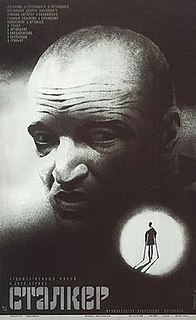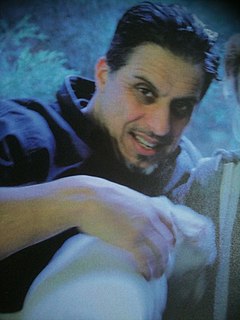Related Research Articles

Andrei Arsenyevich Tarkovsky was a Russian filmmaker, writer, and film theorist. He is widely considered one of the greatest directors in the history of cinema, and one of Russia's most influential filmmakers. His films explored spiritual and metaphysical themes, and are noted for their slow pacing and long takes, dreamlike visual imagery, and preoccupation with nature and memory.

Stalker is a 1979 Soviet science fiction art film directed by Andrei Tarkovsky with a screenplay written by Boris and Arkady Strugatsky, loosely based on their 1972 novel Roadside Picnic. The film combines elements of science fiction with dramatic philosophical and psychological themes. Modern reviews of Stalker have been highly positive.

Ivan's Childhood, sometimes released as My Name Is Ivan in the US, is a 1962 Soviet war drama film directed by Andrei Tarkovsky and co-written by Mikhail Papava and an uncredited Tarkovsky, based on Vladimir Bogomolov's 1957 short story Ivan. The film features child actor Nikolai Burlyayev along with Valentin Zubkov, Evgeny Zharikov, Stepan Krylov, Nikolai Grinko, and Tarkovsky's wife Irma Raush.

Andrei Rublev ; Born in the 1360s, he died between 1427 and 1430 in Moscow and is considered to be one of the greatest medieval Russian painters of Orthodox icons and frescos.

Sergei Parajanov was a Soviet film director and artist of Armenian descent who made significant contributions to Soviet cinematography through Ukrainian, Georgian, and Armenian cinema. He invented his own cinematic style, which was totally out of step with the guiding principles of socialist realism. This, combined with his controversial lifestyle and behaviour, led Soviet authorities to repeatedly persecute and imprison him, and suppress his films.

Andrei Sergeyevich Mikhalkov-KonchalovskyOZO is a Soviet and Russian filmmaker, theatre director, and screenwriter. He is a laureate of the Order "For Merit to the Fatherland", a National Order of the Legion of Honour, a Officer of the Order of Arts and Letters, a Cavalier of the Order of Merit of the Italian Republic and a People's Artist of the RSFSR.

Andrei Rublev is a 1969 Soviet biographical historical drama film directed by Andrei Tarkovsky and co-written with Andrei Konchalovsky. The film was remade and re-edited from the 1966 film titled The Passion According to Andrei by Tarkovsky which was censored during the first decade of the Brezhnev era in the Soviet Union. The film is loosely based on the life of Andrei Rublev, the 15th-century Russian icon painter. The film features Anatoly Solonitsyn, Nikolai Grinko, Ivan Lapikov, Nikolai Sergeyev, Nikolai Burlyayev and Tarkovsky's wife Irma Raush. Savva Yamshchikov, a famous Russian restorer and art historian, was a scientific consultant of the film.

Gueorgui Pinkhassov is a photographer, born in Moscow in 1952. He is a member of Magnum Photos.

Nostalghia is a 1983 Soviet-Italian film, directed by Andrei Tarkovsky, and starring Oleg Yankovsky, Domiziana Giordano, and Erland Josephson. Tarkovsky co-wrote the screenplay with Tonino Guerra.

Mirror is a 1975 Russian art film directed by Andrei Tarkovsky. It is loosely autobiographical, unconventionally structured, and incorporates poems composed and read by the director's father, Arseny Tarkovsky. The film features Margarita Terekhova, Ignat Daniltsev, Alla Demidova, Anatoli Solonitsyn, Tarkovsky's wife Larisa Tarkovskaya and his mother Maria Vishnyakova. Innokenty Smoktunovsky provides voiceover and Eduard Artemyev the incidental music and sound effects.

Sculpting in Time is a book by Russian filmmaker Andrei Tarkovsky about art and cinema in general, and his own films in particular. It was originally published in 1986 in German shortly before the author's death, and published in English in 1987, translated by Kitty Hunter-Blair. The title refers to Tarkovsky's own name for his style of filmmaking.

Time Within Time: The Diaries 1970–1986 are the diaries of the Russian filmmaker Andrei Tarkovsky. They cover his life and work in the Soviet Union and the time of his exile in Western Europe. After the 1991 coup several memos surfaced that alleged that the KGB had at times access to the diaries. Although Tarkovsky did not openly oppose the Soviet system, his work heavily emphasized spiritual themes, that were at conflict with the official anti-religious atheist ideology, prompting the KGB to open a file on him.

Solaris is a 1972 Soviet science fiction art film based on Stanisław Lem's novel of the same name published in 1961. The film was co-written and directed by Andrei Tarkovsky, and stars Donatas Banionis and Natalya Bondarchuk. The electronic music score was performed by Eduard Artemyev; a composition by J.S. Bach is also employed.

Mikhail Nikolayevich Romadin was a Russian painter, book illustrator, movie art designer and theater artist. He graduated from the All-Union State University of Cinematography. He is a third generation artist; his grandfather M.Romadin was an artist and his father N.M. Romadin, was a landscape artist and Academician

Andrei Severny is a contemporary filmmaker, screenwriter, photographer and visual artist. Severny's films include Buried Seeds, Inside Risk: Shadows of Medellin, Gravitation: Variation in Time and Space, Condition, Teaching to See, Disparaît, v and Tom on Mars.

0010x0010 is a Dutch-born audiovisual artist, currently living in Los Angeles.
Aleksandr Nikolaevich Misharin also known in English as Alexander Misharin was a Soviet - Russian screenwriter, playwright, novelist, actor and senior editor of Russian periodicals. An Honored Artist of the Russian Federation (2000), he was a close friend of Andrei Tarkovsky with whom he wrote several screenplays, including Tarkovsky's celebrated masterpiece Mirror.

Yuri Nikolaevich Arabov is a Russian screenwriter, writer, poet and educator. He is known for his long-lasting collaboration with Alexander Sokurov. He is an Honored Artist of the Russian Federation (1999).
Deimantas Narkevičius is one of the most consistent and widely recognised Lithuanian artists on the international art scene. Originally trained as a sculptor, Narkevičius has mainly been working with film and video. Employing documentary footage, voice-overs, interviews, re-enactments and found photographs, his films submit historical events to the narrative structures of storytelling and cinema. In his artistic practice Narkevičius examines the relationship of personal memories to political histories, particularly those of his native Lithuania. For the artist history, itself has become both material and methodology.
Arvo Iho is an Estonian film director, cinematographer, actor and photographer, who has worked in the areas of documentary and drama.
References
- ↑ "Hisaji Hara". Michael Hoppen Gallery. Retrieved 8 Aug 2016.
- ↑ "Hisaji Hara - Artists - Danziger Gallery". Danziger Gallery. Retrieved 8 Aug 2016.
- ↑ "Hisaji Hara". MEM. Archived from the original on 8 October 2017. Retrieved 8 Aug 2016.
It’s not really photographers whom I admire, but the incredibly accomplished Russian director Andrei Tarkovsky. It seems to me that he was a director who created his own cinematic devices, rather than rely on the cinematic devices shared by most 20th century works. That’s why his work never seems to grow old.
- ↑ Hara, Hisaji. "Interview with Japanese Artist Hisaji Hara" (Interview). Interviewed by lomography. Retrieved 8 Aug 2016.